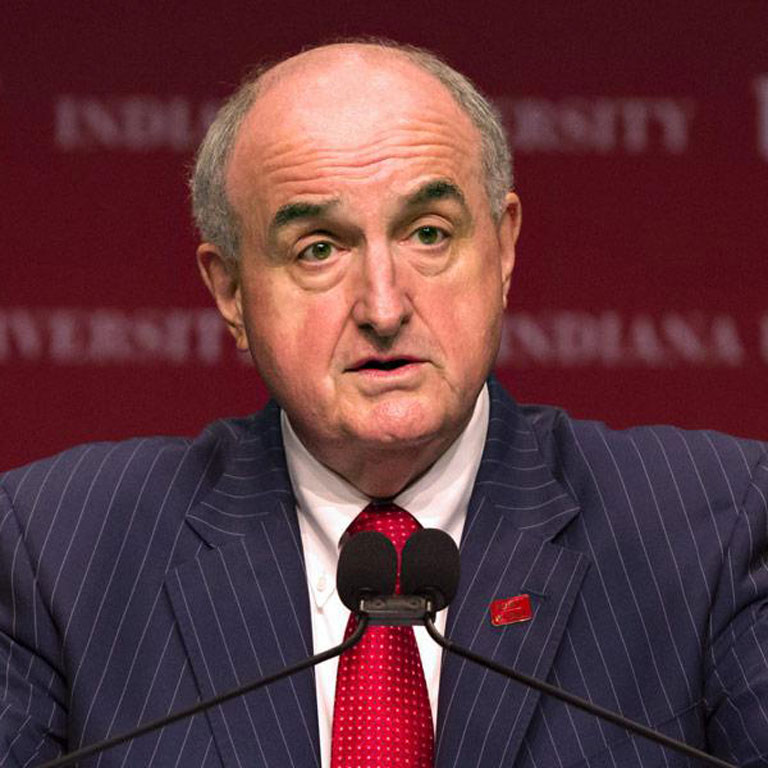This column was submitted by Michael A. McRobbie, president of Indiana University to the Herald Times.
Indiana University’s 11th president, Herman B Wells, is a legendary figure in the history of our nearly 200-year-old university and in American higher education more generally. He is revered for his many accomplishments that helped transform IU into the world-class academic institution it is today. He is equally celebrated for his words and actions that continue to inspire us and remind us of our shared responsibility to engage with, learn from and respect one another.
In 1944, Wells took what was, at that time, the very unusual step of speaking out publicly on civil rights. In a speech delivered at a Bloomington church he had attended as an IU student, he gave a vigorous exhortation on “the brotherhood of man.” Wells said, in part: “We must renounce prejudice of color, class and race in Bloomington and Monroe County, Indiana. Our renunciation must be personally implemented by deeds. Our actions will be the measure of the sincerity of our words.”
With this statement, President Wells expressed IU’s deep and abiding commitment to diversity and equity, which we honor and celebrate as part of Black History Month.
His own actions amply demonstrated the sincerity of his words. He would go on to lead the charge to desegregate IU’s athletics programs and facilities as well as its dining and residence halls. He took a number of actions — often without much fanfare — that helped to improve race relations in the entire Bloomington community. He also opened IU’s doors to African-American teachers from the southern U.S. who could not earn master’s degrees in their home states. Many teachers from that era hold graduate degrees from IU because Wells encouraged them to come to IU Bloomington.
Today, IU is committed to building on the strong foundations established by a number of visionary leaders and champions of equality and social justice who, over many years, helped to create a culture at IU where diversity is embraced in the broadest sense.
The growing diversity of our core campuses in Bloomington and Indianapolis, which last fall welcomed their largest, most diverse and most academically prepared group of first-year students ever, reflects our sustained and focused effort in this area. Today, around one in every four beginning students at IU Bloomington and IU Indianapolis are minority students. IU Bloomington, which welcomed a record number of minority students (8,232) last fall, also set a record with more than 1,900 African-American students, and the percentage of minorities now on campus (21 percent) almost exactly mirrors that of our state.
Additionally, IU Bloomington and IU Indianapolis have once again received the Higher Education Excellence in Diversity Award from Insight Into Diversity magazine, the oldest and largest diversity-focused publication in higher education. The award recognizes schools that have demonstrated a strong commitment to diversity and inclusion through their innovative programs, hiring practices, training, curriculum and on-campus support systems. In addition to winning the HEED Award for the third consecutive year, IU Bloomington also earned Insight Into Diversity’s highest distinction, the Diversity Champion, a recognition given to only 15 universities around the nation.
All of this demonstrates the outstanding success of initiatives such as the Groups Scholars Program, which has provided guidance and support for low-income and first-generation students at IU for a half century, and the Hudson and Holland Scholars program, which recruits high achieving, underrepresented minority students to the IU Bloomington campus.
We are also committed to the success of several new initiatives that have made diversity recruitment and retention of excellent faculty a top priority and have already resulted in gains among underrepresented minority groups and women faculty in fields where they are underrepresented.
Our work is far from done. More efforts will be needed to attract talented minority students to our campuses and to provide those students with the mentorship, support and other resources they need to reach their fullest potential. Recent events around our country also have demonstrated the vital importance of preparing our students to live in an increasingly diverse and interconnected world and bridge cultural and social divides.
Herman B Wells helped build the foundation for IU to be a leader in diversity and inclusion. As we prepare for IU’s bicentennial and our third century, we look forward to strengthening these core components of the university’s mission and supporting equal access, participation and representation on all of our campuses.


